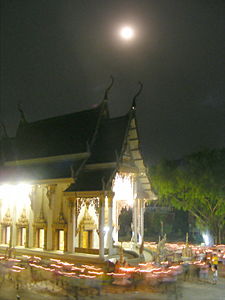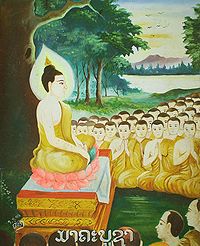- Magha Puja
-
Māgha Pūjā Day / Makha Bucha Day 
Observed by Thai, Lao, and Cambodian Buddhists Type Buddhist Date Full moon day of the 3rd lunar month 2010 date 28 February 2011 date 18 February Māgha Pūjā or Makha Bucha (Lao: ມະຄະບູຊາ; Thai: มาฆบูชา (Pronunciation); Khmer: មាឃបូជា) is an important Buddhist festival celebrated in Thailand, Cambodia, and Laos on the full moon day of the third lunar month (this usually falls in February). The third lunar month is known in the Thai language as Makha (Pali: Māgha); Bucha is also a Thai word (Pali: Pūjā), meaning "to venerate" or "to honor". As such, Makha Bucha Day is for the veneration of Buddha and his teachings on the full moon day of the third lunar month.
The spiritual aims of the day are: not to commit any kind of sins; do only good; purify one's mind.
Māgha Pūjā is a public holiday in Thailand, Laos and Cambodia - and is an occasion when Buddhists tend to go to the temple to perform merit-making activities.
 It was nine full months after Buddha got Enlightenment, on the full-moon day of 6th lunar month, 45 year before the Buddhist era.
It was nine full months after Buddha got Enlightenment, on the full-moon day of 6th lunar month, 45 year before the Buddhist era.
Contents
Origin of Māgha Pūjā Day
Māgha Pūjā day marks the four auspicious occasions, which happened nine months after the Enlightenment of the Buddha at Veḷuvana Bamboo Grove, near Rājagaha in Northern India. On that occasion, as recorded in the commentary to the Mahāsamayasutta, DN-Comm 20) four marvellous events occurred:
- There were 1,250 Arahata, that came to see the Buddha that evening without any schedule.
- All of them were Arhantas, the Enlightened One, and all of them were ordained by the Buddha himself.
- The Buddha gave those Arhantas principles of the Buddhism, called "The ovadhapatimokha". Those principles are: - To cease from all evil,- To do what is good,- To cleanse one's mind;
- it was the full-moon day.
The Buddha gave an important teaching to the assembled monks on that day 2,500 years ago called the 'Ovādapātimokha'[1] which laid down the principles of the Buddhist teachings. In Thailand, this teaching has been dubbed the 'Heart of Buddhism'.
Activities to be observed on Māgha Pūjā Day
- In the evening of Magha full-moon day, each temple in Thailand holds a candlelight procession called a wian tian (wian meaning circle; tian meaning candle). Holding flowers, incense and a lighted candle, the monks and congregation members circumambulate clockwise three times around the Uposatha Hall - once for each of the Three Jewels – the Buddha, the Dharma, and the Sangha.
- Tum Boon: Making merit by going to temples for special observances and join in the other Buddhist activities.
- Rub Sil': Keeping the Five Precepts. Practise of renunciation: Observe the Eight Precepts, practise of meditation and mental discipline, stay in the temple, wearing white robes, for a number of days.
References
- ^ D.ii.49, Dh.183
- Magha Puja
- Dharmic stories calendar 2009; Source Tripitaka From Yodkaew; Jurarath Wichanadhi
External links
Buddhism Buddhism portal Categories:- Buddhist festivals
- Festivals in Cambodia
- Festivals in Thailand
- February observances
- Buddhist holidays
Wikimedia Foundation. 2010.

